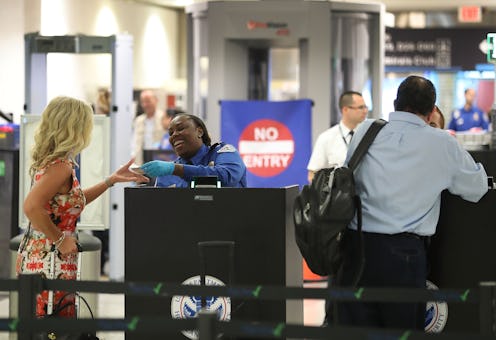News
The Electronics Ban For Flights Will Begin Soon

For years, you've had to have your electronics' batteries powered up in order to bring them aboard a U.S.-bound airplane. If it didn't turn on, you left it behind. Now, though, if you're flying out of 10 airports in eight Muslim-majority countries, you'll have to pack your electronics in your checked luggage. On Monday, following tweets from a couple Middle Eastern airlines, news agencies reported on the measure, which is designed as an increased security measure following an "unspecified terrorism threat," Reuters reported. So when will the electronics ban for flights start?
Some airlines were reportedly first informed Monday and were given 96 hours to comply, according to the Guardian. Both Royal Jordanian and Saudia Airlines posted information to their Twitter pages to inform customers. Royal Jordanian later removed its post and replaced it with a notice that "further updates will be announced soon." Ultimately, some airlines could take until early Saturday to comply with the rule. The ban was not officially enacted until Tuesday at 3 a.m. ET, and thus the 96 hours would last until 3 a.m. ET on Saturday morning.
As many as 10 airlines are expected to be affected, none of them U.S. airlines. The ban is indefinite. All are based in one of eight Muslim-majority nations in the Middle East and Africa and have flights that leave the following cities, according to what a U.S. official told the Associated Press: Cairo, Egypt; Amman, Jordan; Kuwait City, Kuwait; Casablanca, Morocco; Doha, Qatar; Riyadh and Jeddah, Saudi Arabia; Istanbul, Turkey; and Abu Dhabi and Dubai, United Arab Emirates.
The ban covers all electronics larger than a cell phone and includes things like iPads, Kindles, and portable laptop computers — all the devices we are now used to using in order to pass the time on long, international flights.
ABC News interviewed an aviation expert from Rand Corp. who claimed that the severity of the ban might point to fears of airport or airline personnel being involved in the potential threat. Or at the very least that passenger screening in some of the affected countries might not be good enough.
It could cause other problems, though, including stymieing new streamlined tools that pilots use for flight routes and airport information. Nowadays that is all loaded onto an iPad, which saves carrying all of that on paper. According to the Guardian, such electronic flight bags were not addressed in the initial notice.
Also, there's concern that the electronics might not be safe in checked baggage. Another aviation expert told CBS News that there will now be more worry that valuable items will be stolen from checked baggage. Within the United States, checked bags go through advanced screening. While that's not the case in all foreign countries with U.S.-bound flights, it's still safer to keep any potential threats away from passengers on the plane.
This could prompt a reconfiguring of security procedures abroad. In the meantime, make sure that you pack a book.